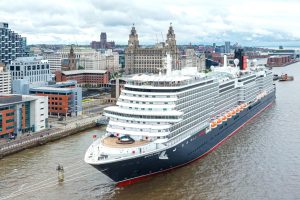Council leader shares ambition for 2024 – widen opportunities for Manchester’s kids, not just the graduates
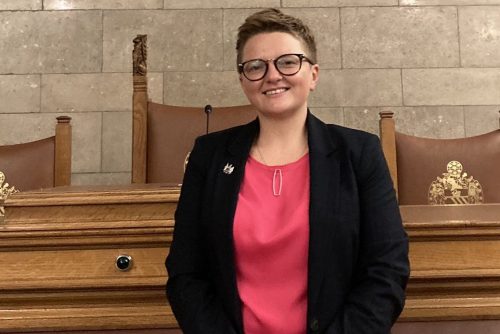
Manchester City Council’s leader Cllr Bev Craig is optimistic.
There might be an absolute earthquake about to hit local government finances, there is a government that has run of ideas but is also acting on instinctive self-preservation, and there are definitely harsh economic conditions challenging so many households she ultimately is in charge of providing services for.
But there’s no war on the motorist, developers won’t get approval just because a scheme has student flats in it and her conversations with global investors from Japan to the USA give her great heart.
But that faith in the future isn’t just the usual Manchester boosterism you’ve come to expect from civic leaders of a city that doesn’t hold back on self-promotion or self-regard.
It’s held up by steady improvements in education and service delivery, making sure that it’s not just the graduates who stick around in the city and enjoy its energy and economic opportunities, but the kids who were raised here too.
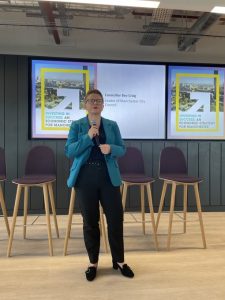
Launching the economic strategy
“What is subtly different about our economic strategy for the next decade is that we’re placing more importance on the people who are growing up and getting on in the city to have access to those opportunities.
“We haven’t been as explicit about that in the past. There’s a risk isn’t that when the world feels a bit gloomy, you accidentally talk down the real positives,” she says.
Her trips to the US and Japan in the last year, meeting potential investors and telling the Manchester story, have further informed the subtle shift to an inclusive economic strategy rooted in the people of the city, rather than relying on importing globally mobile graduates.
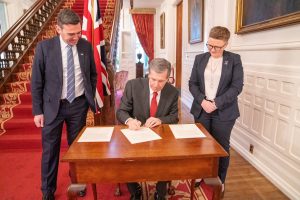
Andy Burnham, North Carolina Governor Roy Cooper and Bev Craig
“When I talk to some of the big tech businesses that have moved to the city, and to GCHQ, one of the draws to Manchester was a diversity of demographics.
“When I was in Japan, and I was telling a significant Japanese tech firm that in our city, we speak almost 200 languages. 30% of our residents were born outside of the UK. That’s the definition of a global city, and that’s an attractive proposition, that kids growing up in Cheetham Hill speaking different languages is one of the reasons that a global company might come to Manchester and that’s actually a really attractive thing to sell.”
She says Manchester’s schools have also improved massively and are performing at or above the national average – “without the investment that the London Challenge got” – including in schools in tough places like Harpurhey.
“I think there’s something really interesting happening in a city that is prepared to take a long term approach around investing in school readiness,” she says. “investing in early years, making sure that you’re starting to see the quality of your schools increase, because you’re helping kids get into primary school. And I think it’s the alignment of those things, with an economic strategy that actually says to businesses, yes, if you move into Manchester, because you like our talent, you need to help us develop our talent.”
Despite other city councils entering into the financial peril of bankruptcy, including close colleagues on the Core Cities group, which she is chairing this year, she doesn’t think Manchester will face that nightmare scenario.
“But if I look at three years down the line, I don’t think any local authority in the country, if we continue in the country at current trajectory will be able to balance in four years time.”
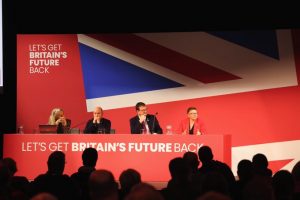
Bev Craig at Labour conference
Her hope then is that a Labour government can reset local government finances, or at least have a “genuine grown up conversation about how you can positively reform public services”. That gets that balance right between the immediacy of what you need now, and preventing a crisis in the future.
You wouldn’t expect the Labour leader of a Labour city to say otherwise, but she’s optimistic a change of government will bring a better fairer settlement for the city, but for local government more widely.
“I think my moving between frustration and fury in the autumn was probably well documented. The fact that I managed to do it without expletives is something to this day that we’re very proud of.”
She makes light of it but her quiet anger is evident. “I think the frustration comes from years and years of essentially gaslighting us over the cuts to local services, and the impact that it would have.
“For us, HS2 was a highly significant infrastructure investment, over the course of a 14 year period, that would have transformed, but only to the level of bringing us up to standard with other European countries, and Japan.”
She gives the example of someone on Universal Credit being hammered for going on a training course where they provide a sandwich and a brew, and that then affects their entitlement to benefits.
Despite what she describes as gaslighting from central government, the betrayal over HS2 – “nakedly political and terribly short sighted” and intractable hardship and poverty amongst “too many” of the city’s families, she sees much to lift her spirits.
“2024 is quite a big year,” she says, “and there are a number of things, policy wise, that will hopefully align.”
Close observers of Manchester planning policy see the acceleration of high density housing in the city centre and the proliferation of purpose built student accommodation (PBSA), since 2012, a firm policy designed to reclaim neighbourhoods like Fallowfield for families and not houses of multiple (student) occupation.
But she also issues a caveat to that. “It doesn’t mean that we will approve every scheme that’s got PBSA in any development in the city, it has to be in the right place,” she says.
“Because whilst we’ve not got enough student accommodation at the moment, we also don’t want too much. So if something’s not in the right place, and if it’s in there just to help achieve viability of a scheme, then that’s not going to be something to pursue. But if it’s something that’s in the right place, that’s a strategic fit, and aligns with what we need in terms of student numbers,” she adds.
She also pushes back on the charge that the city centre is anti-car.
“Nobody’s banning cars. Nobody’s got a war of motorists. I think Manchester is always going to have change.”
She acknowledges that new neighbourhoods and bus lanes – one on Oxford Road has yielded £1m in fines – have surprised some people driving in, maybe for the first time since the pandemic.
“When you have a city that’s growing, change is going to happen. But also if you think back when people didn’t live in the city centre, everybody travelled in. Whereas now the vast majority of people that live in the city centre don’t drive, so the nature of how people use streets is changing.
“We have been moving to make bits of the city centre more walkable, such as Stevenson Square, for example. You’re looking at the ability to actually make it a good, pleasant experience by foot, so you will see the number of cars parking spaces over time decrease, but that’s part of natural development. And it also sits alongside investment in better public transport.”
Reflecting on the achievements of 2023, which she says have “cemented Manchester’s growing reputation” such as the high profile Chanel fashion show, which she says “brought £8 million quid directly into the pockets of Manchester, with direct marketing costs worth over the 200 million quid shows actually brand Manchester is really important.”
When Cllr Craig took over as leader from Sir Richard Leese she says she was keen to stick to “the things that the city did right, that are working, but not being afraid to look at what might need a refresh shakeup, or just a bit of an adjustment or modernisation.”






